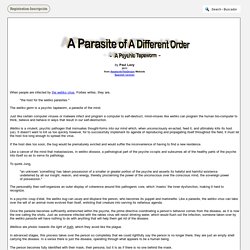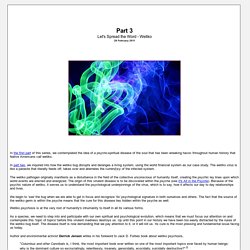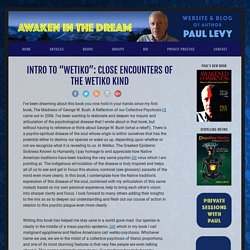

SHADOW TECH. Seeing Wetiko In The World Around Us. The Toxoplasma Of Rage. “Nobody makes an IRC channel for no reason.

Who are we doing this versus?” — topic of #slatestarcodex Some old news I only just heard about: PETA is offering to pay the water bills for needy Detroit families if (and only if) those families agree to stop eating meat. (this story makes more sense if you know Detroit is in a crisis where the bankrupt city government is trying to increase revenues by cracking down on poor people who can’t pay for the water they use.)
Predictably, the move has caused a backlash. Of course, this is par for the course for PETA, who have previously engaged in campaigns like throwing red paint on fashion models who wear fur, juxtaposing pictures of animals with Holocaust victims, juxtaposing pictures of animals with African-American slaves, and ads featuring naked people that cross the line into pornography. People call these things “blunders”, but consider the alternative. PETA creates publicity, but at a cost. But at least they’re paying attention! [source] The Monster Hijacking Human Minds. The Temptation of Saint Anthony by Matthias Grünewald, ca.1512-15 DEEP IN THE SWELTERING jungles of the Amazon, embedded within bird droppings, are eggs belonging to a nematode worm known as Myrmeconema neotropicum.

Soon, ants from the species Cephalotes atratus will come along and take the droppings to their nest. The ants feed the excrement to their larvae, causing them to inadvertently swallow the eggs. Inside each larva’s abdomen, the eggs hatch, and as the larva develops into a young ant, its occupants also begin to develop. A Parasite of A Different Order - A Psychic Tapeworm. The wetiko germ is a psychic tapeworm, a parasite of the mind.

Just like certain computer viruses or malware infect and program a computer to self-destruct, mind-viruses like wetiko can program the human bio-computer to think, believe and behave in ways that result in our self-destruction. Wetiko is a virulent, psychic pathogen that insinuates thought-forms into our mind which, when unconsciously en-acted, feed it, and ultimately kills its host (us). It doesn’t want to kill us too quickly however, for to successfully implement its agenda of reproducing and propagating itself throughout the field, it must let the host live long enough to spread the virus. Capitalism is a Paperclip Maximizer.
There is a classic thought experiment in the field of artificial intelligence which is often used to explain how an AI might inadvertently cause the destruction of humanity as a by-product of trying maximize its goals.

The Greatest Epidemic Sickness Known to Humanity. The following is Part One in a series.

Read Part Two here. In the book Columbus and other Cannibals, indigenous author Jack D. Forbes lucidly explores a psychological disease that has been informing human self-destructive behavior that Native American people have known about for years. Seeing Wetiko: On Capitalism, Mind Viruses, and Antidotes for a World in Transition. Vampire Squid Economics: A Case Study in Full-Blown Wetiko Disease. The Wetiko Virus - 03. Part 3 Let's Spread the Word - Wetiko 28 February 2011 In the first part of this series, we contemplated the idea of a psycho-spiritual disease of the soul that has been wreaking havoc throughout human history that Native Americans call wetiko.

The Wetiko Virus - A Malignant Egophrenia. IT’S ALL IN THE PSYCHE. Paul Levy - Dispelling Wetiko: Breaking the Curse of Evil. INTRO TO “WETIKO”: CLOSE ENCOUNTERS OF THE WETIKO KIND. I’ve been dreaming about this book you now hold in your hands since my first book, The Madness of George W.

Bush: A Reflection of our Collective Psychosis [i] came out in 2006. I’ve been wanting to elaborate and deepen my inquiry and articulation of the psychological disease that I wrote about in that book, but without having to reference or think about George W. Bush (what a relief!). There is a psycho-spiritual disease of the soul whose origin is within ourselves that has the potential either to destroy our species or wake us up, depending upon whether or not we recognize what it is revealing to us. In Wetiko: The Greatest Epidemic Sickness Known to Humanity, I pay homage to and appreciate how Native American traditions have been tracking the very same psychic [ii] virus which I am pointing at. Writing this book has helped me stay sane in a world gone mad. Mind Virus Wetiko: Collective Shadow of Humanity.